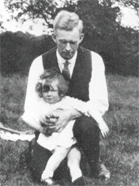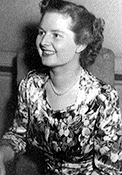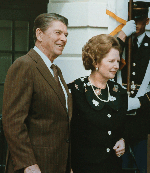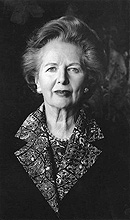Margaret Thatcher (1925-2013)
Margaret Thatcher was born on 13 October 1925 in Grantham, Lincolnshire. She died peacefully in London on 8 April 2013
Assessments are being offered on all sides. Here are some memorable moments and sayings from a remarkable life, linked to public and private documents on this site.
There are links to video at the end.
1925-1952

Margaret Roberts' birth notice appeared in The Grantham Journal on 17 October 1925.
She was baptised in the local Wesleyan Methodist Chapel shortly after Christmas. Hers is the only baptism recorded there between July and the following January, the town's birthrate taking a decade to recover from the loss of young men in the Great War. MT's father, Alf Roberts, had been rejected for service owing to poor eyesight.
Alf Roberts was a lay preacher some of whose sermon notes survive in his daughter's papers, written in the back of her old school exercise books. There is a fragment striking for its sense of parental duty and love and another - addressed to aspirant lay preachers - which warned that "God wants no faint hearts for his ambassadors. He wants men who having communed with heaven can never be intimidated by the world". A third fragment teaches that "Strength comes from within".
Alf was a prominent local councillor, who agonised about allowing games in the town parks on Sundays, and an active Rotarian for whom politics was a strong interest. As the international scene grew darker in the later 1930s he became very aware of the totalitarian threat, and spoke of living in a "manacled age". But he had doubts about the wisdom of Germany's treatment in the Versailles Treaty of 1919 and like most of his contemporaries, he applauded Chamberlain's apparent success at Munich in 1938.
MT seems always to have thought of herself as a Conservative and first worked for the party at the General Election of 1935, aged 10. Her father never accepted the label and is probably best described as an anti-socialist. When Labour captured Grantham Council in 1952, he was ousted as an Alderman in a painful scene, the local press photographer capturing the moment when he laid down his robes of office before leaving the council chamber for the last time. MT wept when she recalled the event in a television interview more than thirty years later.
MT won a place at Oxford to study chemistry in 1943. She gave her first political speech in July 1945, delivered in a local market square while she was home for the university holidays.
After university she became a research chemist, living first in Colchester then moving to the unglamorous industrial town of Dartford, where she had been selected as Conservative Parliamentary candidate in an unwinnable seat. This was a very happy time for her and she flourished in the role, winning wonderful reviews from party officials. It was at a Dartford Conservative dinner party that she met her future husband, Denis Thatcher. They married in 1951.
1952-1979

After giving birth to twins in 1953 - Carol and Mark - MT quickly resumed the search for a winnable Conservative seat. She received some painful rejections from local Conservatives who thought that a young mother should stay at home with her children, and momentarily decided to give up politics for law, an experience recorded in a letter to the Party's Vice Chairman. The file kept on her by Conservative Central Office, from which this comes, is full of insight into what she was like in her 20s and 30s.
She made her maiden speech in the House of Commons on 5 February 1960 and gave her first television interview the following day. She was able to reach Cabinet rank in 1970 without appearing on television more than a handful of times.
She became a junior minister in 1961 and held a succession of jobs when the Conservatives were in Opposition after 1964, joining the Shadow Cabinet in 1967.
In 1968 she gave a lecture asking What's wrong with politics? which revealed a good deal as to her political outlook at the time.
Edward Heath became Conservative leader in 1965 and Prime Minister when the Conservatives won the General Election of 1970. MT's relations with Heath were never good, though not for want of trying on her side. As Heath's Education Minister she eagerly promoted a meeting with him to discuss "The Principles of Education", but it took 18 months to arrange and an official thoughtfully suggested to the Prime Minister: "I doubt if it would be practicable to exclude her from the discussion, but you might perhaps like to bring in a number of non-officials to liven things up". Her first two years in the job were very difficult. She was vilified for cancelling free school milk for children over 7 and catchily dubbed "milk snatcher" by Labour critics. The Sun had called her "the most unpopular woman in Britain". Some of the impression of harshness surrounding her public persona was first created in these years.
She was badly shaken but also toughened by the experience. She remained outwardly loyal to Heath, though at odds with some of his closest colleagues, as revealed by a newly-published note of an indiscreet lunchtime conversation she had with an American diplomat in 1973.
When she told a TV audience in 1973 "I don't think there will be a woman Prime Minister in my lifetime" it seemed a reasonable prediction.
The Conservatives left office after a General Election defeat in February 1974. A second defeat in October fatally undermined Heath's leadership and MT ran for the job, against all odds defeating him on the first ballot. Drawing Heath's defeat to the attention of the White House, the US State Department could barely believe what it was seeing. Other candidates then entered the race, but MT now had the edge and won election as Conservative leader on 11 February 1975. She gave a euphoric performance at a Press Conference afterwards.
What is now called "Thatcherism" began to be shaped in the years that followed.
She decried collectivism, predicted the "withering away of the class struggle" and embraced free enterprise, as preached by her closest political friend and mentor, Sir Keith Joseph.
In January 1976 she gave the speech which caused the Soviets to dub her "the Iron Lady".
Internally the Conservatives were sharply divided, especially on what to do about the trade unions. A highly secret minute from January 1978 reveals the intensity of the arguments on the union question.
In the end events decided the issue. The Winter of Discontent in 1978-79 created a new political landscape. She made one of her best Parliamentary speeches in a debate on the strikes.
1979-1990

MT prayed on the steps of Downing Street on 4 May 1979, carrying the headings on a small card in case she forgot the words.
After the Dublin European Council in November 1979 she began a long battle with the European Community when she asked for a refund.
On Christmas Day 1979 the Soviets invaded Afghanistan and she concerted her response by phone with President Carter.
At the October 1980 Conservative Conference, in the midst of economic recession, she warned that she was not for turning.
Ronald Reagan took office as President in January 1981. She was his first foreign visitor and received the warmest possible welcome and a mass of photo opportunities. Privately some of Reagan's key staff were less supportive.
During the Falklands War US Secretary of State Al Haig tried to broker a settlement and was left in no doubt as to MT's resolve. When the President rang to suggest a premature ceasefire, he barely got a word in.
She invited the press to rejoice at the capture of South Georgia on 25 April 1982 and announced that White Flags were flying over Port Stanley on 14 June.
At Cheltenham the following month she drew an important moral from the Falklands war: "We have ceased to be a nation in retreat".
In January 1983 she talked of "Victorian Values". In October 1983 the US invasion of Grenada prompted another fraught phone conversation with Ronald Reagan. By this stage in fact the President was a strong admirer, as his Ambassador to Britain found out when he wrote criticising her.
In October 1984 she survived an IRA bomb during the Conservative Conference at Brighton, insisting that the Conference go on and making her big speech the following day as scheduled.
Meeting Gorbachev for the first time in December 1984 she declared: "We can do business together". A few days later she flew to Washington and briefed the President at Camp David.
She defended Ronald Reagan's decision to bomb Libya in April 1986 and spoke in his defence during the IranContra affair later that year. She wrote him privately a warm letter of encouragement at one of the lowest moments of his career.
Elected for a third term in June 1987, she told an interviewer "there is no such thing as society" and was endlessly scolded for the remark.You can read here exactly what she said, verbatim and in context.
At Bruges in September 1988 she outraged European orthodoxy by declaring: "We have not successfully rolled back the frontiers of the state in Britain, only to see them re-imposed at a European level with a European super-state exercising a new dominance from Brussels".
A week later she spoke with concern about global warming, having done more than any other politician to secure international action to repair the damaged ozone layer.
On 30 October 1990 she made the first of the series of famous statements that marked the end of her premiership, rejecting Commission proposals at the Rome European Council with the words "No, no, no".
When Sir Geoffrey Howe resigned in consequence, she replied to his resignation letter on 1 November, defended herself against rough bowling at the Lord Mayor's Banquet (12 November) and gave three press interviews (15-17 November) when Howe's resignation speech led Michael Heseltine to run against her for the party leadership.
Unable to win the leadership ballot outright, she walked down the steps of the British Embassy in Paris and stated her intention to allow her name to go forward to the second ballot (20 November). When she returned from Paris many cabinet colleagues showed that they did not want her to go on (21 November) and that night she made the decision to resign. The resignation was announced in a statement the following morning (22 November), hours before she delivered an outstanding defence of the Government in the Commons.
She made her remarks departing Downing Street on 28 November.
1990-2013

After leaving office, MT widened and deepened her criticism of the European Union in a speech at The Hague in May 1992.
She was among the first Western leaders to make the case for intervention to protect Bosnia when Serb concentration camps were revealed in August 1992.
She attacked the Treaty of Maastricht in a speech to the House of Lords in June 1993.
She lost her husband Denis in June 2003. Warm tributes were paid him, including an appreciation by his friend, Bill Deedes.
When President Reagan died in June 2004, she delivered a deeply felt eulogy.
Charles Moore, her biographer, detected the mellowing of Margaret Thatcher in an 80th birthday profile.
In later years her health deteriorated following a succession of small strokes. She abandoned public speaking in 2003 and progressively withdrew from public life.
She died peacefully in London on Monday 8 April 2013.
